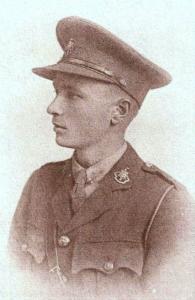
|

|
| 2nd Lieutenant Philip Douglas Atwood KING | |
|
2nd Battalion Royal Sussex Regiment Date of birth: 21st October 1897 Date of death: 18th December 1916 Killed in action aged 19 Buried at AIF Burial Ground Flers Plot II Row D Grave 9 |

|
| Philip Douglas Atwood King was born at 44 Clapton Common, Upper Clapton in London on the 21st of October 1897 the only son of Hubert Atwood King, the Managing Director of a coal company, and Gertrude Lucy (nee Close) King later of 50 Waldeck Road, Ealing in West London W13. He was christened at St Matthew's Church, Upper Clapton on the 28th of November 1897. He was educated at Miss Marshall's School, Worthing, at Wykeham House School, Worthing from 1911 to 1912 and at Lancing College where he was in News House from September 1912 and in Gibbs House from September 1913 until September 1915. He was a Corporal in the Officer Training Corps and was in the Sports and Running Teams in 1915. On leaving School he applied for a place at the Royal Military College Sandhurst on the 1st of October 1915 and passed the entrance examination the following month. He underwent a medical examination in London on the 6th of December 1915 where it was recorded that he was five feet six and a half inches tall and that he weighed 129lbs. It was also recorded that his chest measurement was "1/2 an inch below requirement but likely to develop." He entered the College on the 11th of January 1916. He was commissioned as a 2nd Lieutenant in the Royal Sussex Regiment on the 16th of August 1916. He was attached to the 2nd Battalion of his regiment and joined them while they were resting at Toeufies on the 6th of October 1916. On the afternoon of the 15th of December 1916 the 2nd Battalion Royal Sussex Regiment moved from Bazentin to a position known as Factory Corner where they relieved the 1st Battalion Loyal North Lancashire Regiment in the front line trenches. A and B Companies occupied some front line posts while C and D Companies were held in support and reserve in some ruined factory buildings to the rear. While in these positions they came under occasional shelling as well as fire from rifle grenades from enemy trenches which in places were only 40 yards away. On the night of the 17th of December C and D Companies moved in to the front line posts to relive A and B Companies. In the early morning of the 18th of December 1916 Philip King and his commanding officer were visiting the front line posts when they came under machine gun fire. King was killed while his commanding officer "had a narrow escape". The battalion was relieved the following day. His father received the following telegram dated the 21st of December 1916: - "Deeply regret to inform you 2/Lt. P.D.A. King Sussex Regt. was killed in action Dec eighteenth. The Army Council express their sympathy." His Colonel wrote:- "It is with true sorrow that I am writing to you of your son's death. He was killed by a machine gun as he was going up on duty to the front line. I was quite close to him, and I know that he did not suffer, for which I am thankful. We buried his body at my headquarters, and I am sending up a cross tomorrow, which the battalion relieving me have promised to erect. I shall see the place again, before we leave the line, and shall know all has been done. It seems so little to ask you to accept my sympathy, but I mean it, and feel his loss very truly. He had done well, and had he been spared would have made a really good officer." From his Company Commander:- "I cannot tell you how very deeply and sincerely I sympathise with you in the loss of your son. He was my Subaltern during the time he was out here, and is a very great loss to the Company. Always cheerful and always ready for any work, the men loved him and would have followed him anywhere, and he was very popular indeed with the other officers in the Company. The Company has gone into the line again today, but with a gap, a vacant place, which will not easily be filled." A fellow Subaltern wrote:- " It is needless for me to describe how he fell (knowing that you must have already heard from the Colonel), except that it was while bravely doing his duty under most trying and dangerous circumstances. His was an example of true British chivalry. His loss is felt most deeply by the whole of the regiment, not only by his brother officers, but by all his men, who I know loved hum; in fact, he seemed to inspire a spirit of cheerfulness in everyone with whom he came into contact." Another Subaltern wrote:- "Last Sunday night our Company took over a sector of the front line trenches. In the early hours of Monday morning your son was taking the Colonel along the line and showing him the outposts under his charge, when he was shot through the body and died immediately. The Colonel was within a few yards of him at the moment. The errand your son was performing was a dangerous one, in the course of his duty, and he was fully aware of the danger." He was buried about 500 yards to the north of Flers but his body was re-interred at its present site in 1920. He is commemorated on the war memorial at the Royal Military College Sandhurst. |
|
| Gibbs House |
Back